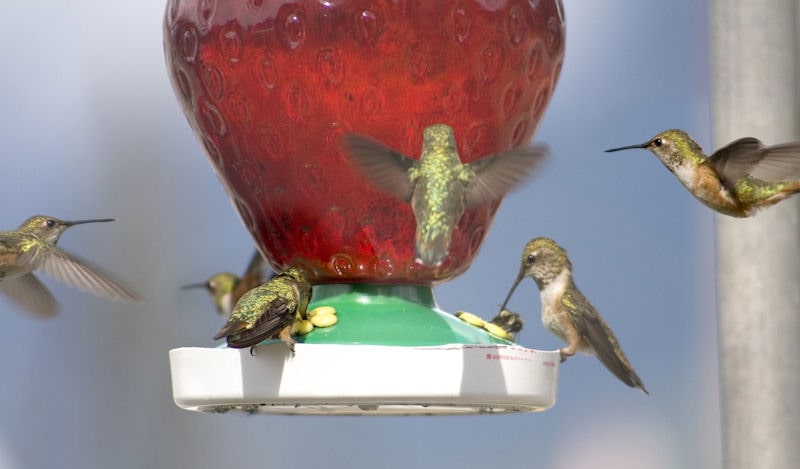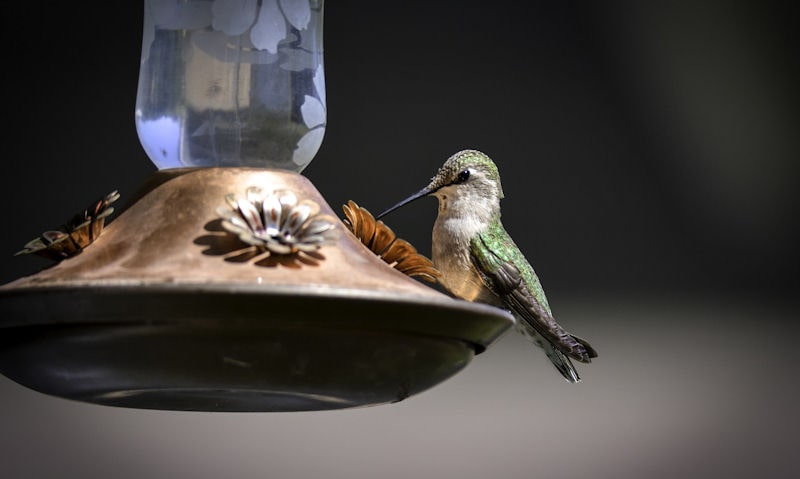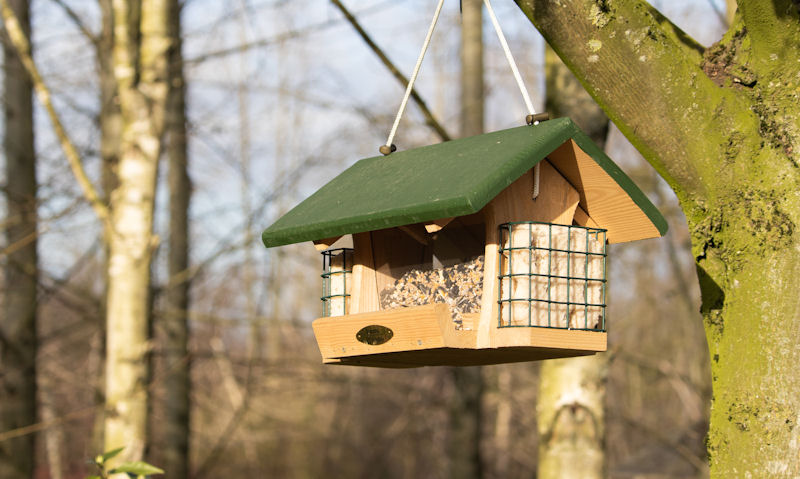Will Hummingbirds share a feeder
Where have you been in regards to backyard birding? Of course hummingbirds share a feeder and will do without incident if nectar-filled feeders are plentiful.
Hummingbirds will share a feeder mostly without trouble when there's little opportunity to perch, which is the reason for fighting. Hummers share a feeder in peace but at times a bully can arrive to defend the feeder - you will then have to hang an additional feeder to provide nectar in a new shared space.
With food resources often coming up short in parts of the country, and a hummingbirds life depending on this energy filled sugary-water, of course things can get a little fracas when nectar is scarce in the wild.
You can expect most hummingbirds to behave on a feeder while their happy to take their turn in hover as they perch to take their much needed long sip of sugary water.
Hummingbirds who are primarily male and not fearful of others will put an end to all this, as they demand the feeder to themselves as it is after all - a resource full of nectar which they do depend on to survive.
Sharing of a hummingbird feeder is found to be safe and hassle-free overall, though at times it could resort in drastic action on your part.
Brand new hummingbird feeder may be used to hang in addition to the original, hung far away from what is now a bully-occupied feeder.
How close should the original hummingbird feeder be to the new addition is about 10 to 20 feet... or much less if the additional brand new feeder is kept out of sight.
You only have a few short months to attract hummingbirds to your yard, and so to your feeder. So before the feeder is taken down come September at the latest then, don't waste time waiting until this single bully hummer to disappear.
It could be weeks or months before the feeder is available to all again, by which time the hummingbird season within the United States could be all but over.
Share in harmony with NO Perch
Absolutely can and will hummingbirds share their feeders with others, which is commonly seen in most hummingbird-filled yards come spring.
Most hummingbirds will have no trouble sharing space, let alone a particular type of hummingbird feeder with others, despite the occasional scuffle kicking off once in a while - but isn't that the case with any bird species who use bird feeders.
Well, just put up the one hummingbird feeder for now to see how they get on in harmony.
Its pleasant, if not a little noisy, but fascinating as anything when they continue not only to share a close space, but with a no-perch hummingbird feeder - hummers can be seen lining up behind, while waiting patiently for their turn as they gracefully hover.
Scuffles will and can happen at times due to lack of space on the feeder, or indeed a single hummingbird causing unnecessary noise.
Whereas few hummingbirds can be territorial in nature thus they will protect the hummingbird feeder for themselves; resulting in a single hummingbird chasing off others to protect his feeder.
Likelihood of males chasing off others is a possibility although this behavior can be present in the females.
Why you have no hummingbirds at your feeder then could be because one hummer is keeping them all away; thus it may be time to invest in an additional hummingbird feeder which is set apart from the troublesome feeder, and therefore the bully hummer.
Feeder perch causes tension
What you must be aware when it comes to trouble developing in and around your hummingbird feeder, can be due to the design of the feeder in use, or indeed lack of available port feeding wells.
Hummingbird feeder perches is definitely one of a few issues that needs resolving, if to at least calm the situation down.
To get a feeder that is constantly under attack by a bully or boisterous hummingbirds when in season, its time stop the bully on the feeder by upgrading to a second feeder that would ideally be located in a brand new, out of the way area in the yard.
However it could be lack of space available on the hummingbird feeder which can make hummers nervous, waiting until then turn.
I would absolutely use a new feeder for that reason but it may be worth upgrading to an extra feeder with many more featured perches.
Hummingbirds will share an enormous hummingbird feeder, though it isn't worth your time and energy if you don't believe you can make the most of it.
What you can do to reduce fighting on the feeder is to reduce the likelihood of bullies perching, thus prioritize a hummingbird feeder without perches.
Hummingbirds will now be forced to hover over the feeding ports to feed, and without anywhere to perch, they can't take up too much time in one area - which will cause waiting hummingbirds to push others along.
Hummers can be territorial
Why hummingbirds can get territorial over a hummingbird feeder could be because natural nectar usually fed on in the wild is scarce due to drought or their feeding grounds disturbed by people or predators.
Certain hummingbirds will then come to a feeder knowing this is a reliable yet scarce nectar resource - thus will begin protecting the feeder as if its their own.
And this is why hummingbirds fight over feeders, because its usually the one greedy hummingbird fighting off all birds coming into its space; or if you like its territory which is the space on and around the feeder.
Situations like this can be calmed down if you at least remove feeders that utilize a perch as this bully of a hummingbird will have nowhere to perch as it puts up a fighting spirit against any fellow hummer that dares to enter its personal space.
Despite just the one hummingbird guarding a single feeder in order to keep the nectar to itself, there isn't anything you can do about it other than hanging a second feeder.
Most hummingbirds who are willing to use our feeders will do while respecting each others space; yet its worth knowing hummingbirds don't forage in their wild alongside other hummers, thus this behavior will be carried over to the feeder.
Add second Hummingbird feeder
You probably won't be able to rid the feeder of a particular territorial hummingbird, thus its vital to think about setting up a new hummingbird feeder location. You'll operate two feeders that are set preferably some distance away from each other.
You'll have to do better than that as the bully will chase off hummers on a near by feeder too, so its imperative then to at least try and keep this secondary feeder out of view.
Hummingbirds will want too continue to use just the one feeder if other hummingbirds are seen to use it, as it can be encouraging to them; you may then have difficulty getting hummers to use two separate feeder locations, as a word of warning.
Ideally you'd want to situate this new hummingbird feeder in a lit up area under the sun, where hummers will begin sharing in peace and quiet in no time at all.
Second bird feeder pole may be needed if you lack the natural space in your yard to hang an additional feeder, but I bet you can find a space without additional expense.
Take for example the roof overhang in which the soffit, exposed rafters or even the guttering can provide the perfect place to hang a hummingbird feeder.
In doing all this, stay mindful of hummingbirds unwillingness to feed near other birds, of which hummingbird feeders must be isolated; set well apart from bird feeders intended to attract Finches, Warblers, or even Orioles who tend to occupy a hummingbird feeder.
To sum it up
I suspect you've never gone through the trouble of finding out about hummingbirds in our yards, because if you had you'll know hummingbirds are quite happy to share a feeder with others.
Other nectar-filled hummingbirds feeders mind you, as they won't share a space with Orioles on a nectar feeder nor will they occupy space frequented by all other common backyard birds, like Robins, Bluebirds to Sparrows.
Hummingbirds have always shared a feeder with others and will continue to if your yard can avoid the occasional bully.
Bullies can arrive in mostly desperate times where food becomes scarce in nature, thus will protect a feeder for themselves in fear of losing their food source.
Nothing can be done about a bully so its imperative you upgrade to an additional feeder, where friendly hummers are willing to share a feeder together.
Hummingbirds can be territorial by nature which correlates to their feeding behavior; hummingbirds don't forage together like other bird species thus are found to be a recluse, living their lives on all their own, which is a shame.
Of course unwilling to feed along their same species can develop issues at the feeder, but as long as you keep the nectar full with as many feeders as it takes to keep the peace, hummingbirds will share a feeder without incident.
If fighting over the feeders persists, convert to a hummingbird feeder without perches, as it makes it difficult for a bully or fighting hummingbirds to take over the feeder.


